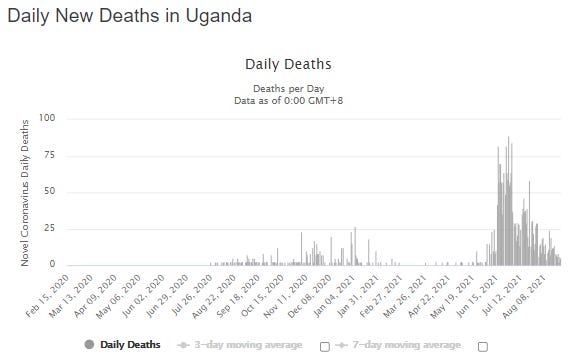Source: Rounding the Earth Author: Mathew Crawford
“He who loves you, loves you with your dirt.” -Ugandan proverb
The Central African nation of Uganda, a country of more than 45 million people, saw only 40 cases of COVID-19 through the end of March, 2020.
Concerned about the potential for a more substantial outbreak of the fast-spreading coronavirus, Uganda jumped on the quickly-growing hydroxychloroquine (HCQ) HCQ bandwagon, most often using it as part of a multi-drug regimen in combination with azithromycin, zinc, vitamin C and vitamin D. Through mid-July, Uganda had seen over 1,000 cases of COVID-19 without a single fatality—the largest such “perfect record” in the world at that point in time.

In late July, citing the World Health Organization’s claim of HCQ’s lack of efficacy, Uganda dropped HCQ as their standard of care for COVID-19 patients. After that decision, during the last eight days of July, Uganda saw its first six COVID-19 fatalities. The cases were not growing so fast as the deaths as Uganda’s case fatality rate (CFR) skyrocketed from the lowest level in the world to among the very highest at nearly 10%.

While it is unclear why a nation handling the pandemic so well would change treatment policy, it may be noteworthy that Uganda received millions of dollars from each the World Bank, the African Development Bank, and the International Monetary Fund, and that totaled more than $1 billion dollars, each within a few days of the decision. Most of that aid came in the form of loans, which angered many Ugandans.
In mid-October, the Daily Monitor declared, “New drug to curb rising COVID-19 deaths,” as the expensive remdesivir got approved for treatment in Uganda. It sometimes seems strange how media outlets believe they know the results before they happen. However, Uganda saw cases and deaths climb for weeks afterward.

More recently, Uganda began its vaccination campaign on March 10, 2021. Since then, the CFR has once again jumped up above world averages, somewhat similar to what happened throughout Europe during the early days of its vaccine campaign. Uganda has only vaccinated around 2% of its population, and that small portion far more gradually than did Europe.
However, since the outset of Uganda’s vaccination campaign, total COVID-19 deaths have jumped from 568 to around 3,000 as of August 27, 2021.
Hydroxychloroquine is why Uganda, with a population of 43M, has only 15 COVID-19 deaths
Uganda also records good results treating COVID with hydroxychloroquine, chloroquine
Local Ugandan firm to make drug for corona
Uganda switches to hydroxychloroquine as 7 more recover from COVID-19

